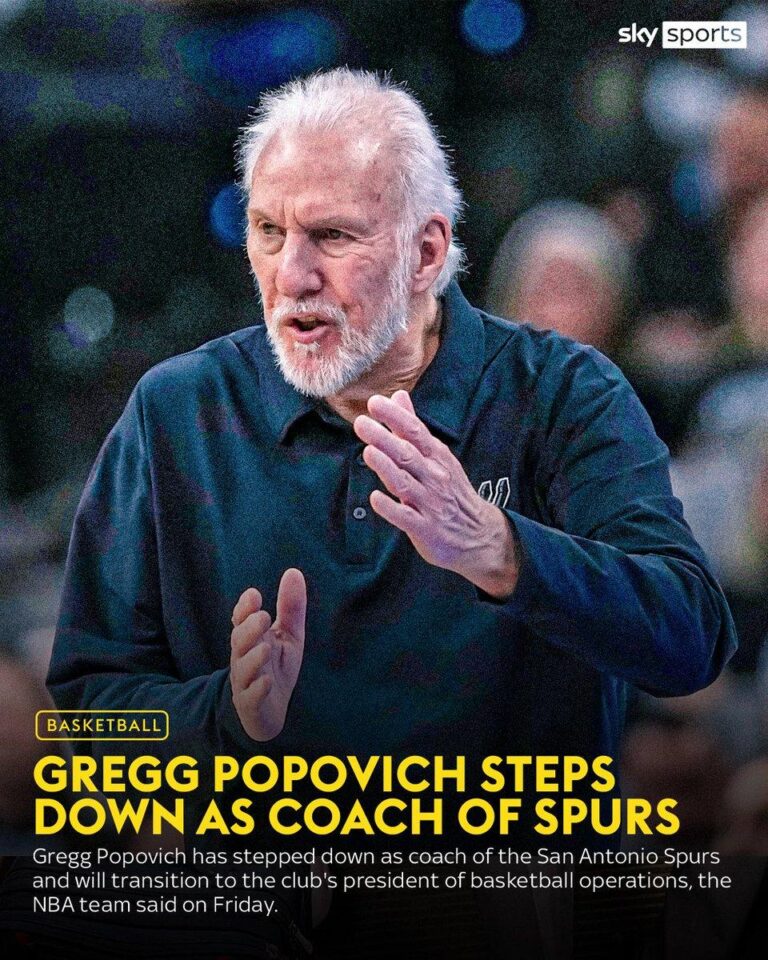Gregg Popovich Transitions from Spurs Head Coach to Influential Leadership Role as “El Jefe”
After nearly three decades at the helm of the San Antonio Spurs, Gregg Popovich has stepped away from his role as head coach to embrace a newly created position dubbed “El Jefe.” This evolution in his career signals a strategic pivot within the Spurs organization, where Popovich will shift focus from daily coaching responsibilities to broader leadership and mentorship duties. His enduring presence is expected to continue shaping the franchise’s identity and competitive edge, blending his vast experience with fresh organizational initiatives.
Popovich’s New Role: Responsibilities and Vision
In his capacity as “El Jefe,” Popovich will take on several key functions designed to influence the Spurs’ long-term success:
- Steering organizational policies and overseeing player growth programs
- Mentoring assistant coaches and emerging players to cultivate future leaders
- Acting as the Spurs’ ambassador in NBA-wide projects and community engagement efforts
This role allows Popovich to leverage his legendary status and deep understanding of the game while empowering the coaching staff to take on more tactical responsibilities. The Spurs’ fanbase and basketball analysts alike anticipate that this leadership shift will preserve the team’s winning culture while fostering innovation.
Career Highlights of Gregg Popovich as Spurs Head Coach
| Milestone | Details |
|---|---|
| Tenure | 28 Seasons (1996–2023) |
| NBA Championships | 5 Titles (1999, 2003, 2005, 2007, 2014) |
| NBA Coach of the Year Awards | 3 Times (2003, 2012, 2014) |
How Popovich’s Shift Reshapes Spurs’ Coaching and Team Dynamics
Popovich’s move from the sidelines to a strategic leadership role introduces a nuanced transformation in the Spurs’ internal operations. Rather than managing in-game decisions directly, he will now emphasize mentorship and organizational strategy, allowing assistant coaches to take greater ownership of tactical execution. This delegation is expected to foster a more collaborative environment, encouraging innovation while maintaining the Spurs’ hallmark discipline and cohesion.
Key adjustments in the Spurs’ approach include:
- Expanded decision-making authority for assistant coaches during games
- Decentralized player development programs promoting autonomy and growth
- Prioritization of long-term franchise goals over short-term results
These changes aim to cultivate a culture of shared leadership and collective intelligence, potentially setting a new standard for NBA coaching structures.
| Element | Before Transition | After Transition |
|---|---|---|
| Game Management | Led directly by Popovich | Delegated to assistant coaches |
| Player Development | Centralized under Popovich | Collaborative with coaching staff |
| Leadership Style | Authoritative and hands-on | Mentorship-driven and inclusive |
Evaluating Popovich’s Enduring Legacy and Prospective Impact as “El Jefe”
Gregg Popovich’s legacy as one of the NBA’s most successful and respected coaches is firmly established, with five championships and a reputation for fostering team unity and resilience. His coaching philosophy, which balances rigorous discipline with empathy, has left an indelible mark on the Spurs and the league at large.
In his new leadership capacity, Popovich is poised to influence the Spurs beyond the court by focusing on:
- Leadership Development: Cultivating the next generation of coaches and executives within the organization
- Strategic Vision: Steering the franchise’s long-term competitive and operational planning
- Community Engagement: Expanding the Spurs’ social initiatives and global outreach programs
| Focus Area | Impact | Anticipated Result |
|---|---|---|
| Mentorship | Coaching Staff | Robust pipeline of coaching talent |
| Organizational Strategy | Front Office Collaboration | Sustained competitive advantage |
| Philanthropy | Community Relations | Expanded local and international support |
Strategic Recommendations for Spurs Leadership to Maximize Popovich’s New Role
To fully capitalize on Popovich’s transition to “El Jefe,” Spurs management should implement structures that facilitate his influence while preserving the autonomy of the coaching staff. Establishing a specialized advisory council composed of former players, coaching veterans, and front office leaders can provide Popovich with a platform to contribute strategically without encroaching on game-day decisions.
Recommended initiatives include:
- Launching a formal mentorship program led by Popovich to nurture emerging coaching and playing talent
- Scheduling regular strategic planning meetings to align organizational goals with team performance
- Investing in advanced data analytics tools to support Popovich’s strategic insights and decision-making
- Promoting community engagement events spearheaded by Popovich to strengthen fan relations and team identity
| Focus Area | Suggested Action |
|---|---|
| Strategic Collaboration | Form advisory board for decision-making support |
| Coach Development | Implement mentorship initiatives |
| Data-Driven Insights | Enhance analytics capabilities |
| Community Engagement | Organize Popovich-led fan and outreach events |
Summary
Gregg Popovich’s evolution from the Spurs’ head coach to the influential role of “El Jefe” ushers in a transformative period for the franchise. His unparalleled leadership and strategic insight will continue to guide the Spurs’ culture and competitive ambitions from a broader vantage point. As the organization adapts to this new structure, fans and basketball experts will keenly observe how Popovich’s mentorship and vision shape the next chapter of Spurs basketball.




